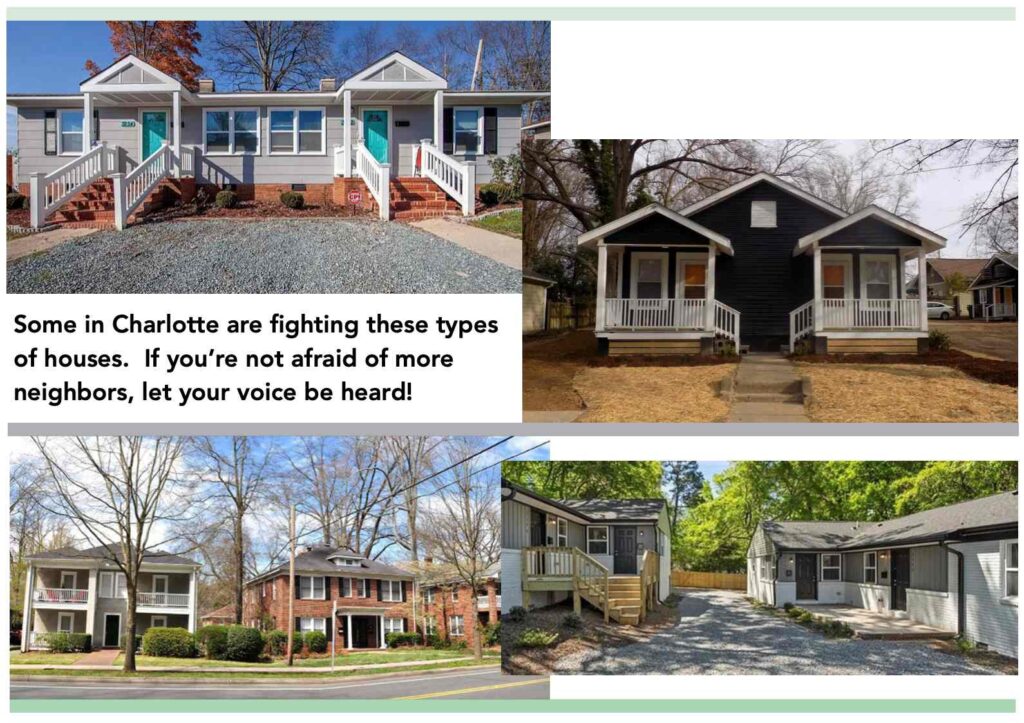Action Alert: help ensure the American Dream is possible for more Charlotteans
This Monday night, Charlotte City Council will undertake a critical vote on the Charlotte Future 2040 Plan. The outcome will shape the way that our city grows for decades to come.
The policy most at risk is one that is an essential tool for fighting segregation, rising housing costs, displacement, climate change, and barriers to opportunity.
Policy 2.1 in the plan would improve neighborhood diversity and inclusion by ending exclusionary zoning.
What does that mean? It’s currently illegal to build houses for two, three, or four families on over 75% of Charlotte’s residential land without an expensive and time-consuming re-zoning. Policy 2.1 would allow more types of housing to be built in residential neighborhoods, but only if they follow rules on size and scale to ensure that they blend in with existing homes.
With the Charlotte Future 2040 Plan, we have an opportunity to begin to reverse decades of exclusionary zoning practices that have segregated our community by race and income. For a clear explanation of how exclusionary zoning has held back many of our residents and damaged our community, check out this article: Tearing Down The Walls.

Here are some key benefits of legalizing houses for two, three, or four families:
-
Reduces displacement. Maintaining the status quo of excluding anything but single-family homes in neighborhoods will perpetuate the process of displacement throughout the city. By setting a limit on how many houses can be built, our current zoning, if allowed to continue, will artificially drive up prices by limiting the supply of housing. When land and home prices rise, renters are at higher risk of displacement.
-
Improves access to opportunities and social cohesion. The current ban on building houses for two, three, or four families drives racial and economic segregation. These types of homes tend to be less expensive to own or rent, with lower rent growth, and have more diverse tenants.
-
Improves housing affordability. Land prices are skyrocketing. Allowing two, three, or four-family houses to be built on a lot would increase housing supply to meet the growing demand. As new housing supply increases to meet the existing demand, more “naturally occurring affordable housing” (often older buildings) will become available.
-
Reduces environmental and climate impacts. Only allowing single-family homes perpetuates sprawl into our undeveloped green spaces and perpetuates our over-reliance on automobiles and the air and climate pollution they emit.
-
Makes financial sense. Allowing more than one home per lot would maximize taxpayer investment in the existing public infrastructure like sewer, water, sidewalks, and roads. Less sprawl into undeveloped areas means shorter commute times and less economic productivity lost to traffic congestion for people who can live within existing neighborhoods with abundant transportation choices.
Unfortunately, after years of robust community discussion, a small, vocal, politically-connected minority is standing against our community’s vision. They’re well-funded, so we need to make sure our voices are heard loud and clear!
Please contact your City Council Members now and ask them to vote in support of policy 2.1 of the 2040 Plan this Monday to legalize two, three, and four family houses across our city!
Thank you in advance for speaking up and supporting equitable housing choices! Questions? Email our Program Director Meg Fencil at meg.fencil@sustaincharlotte.org.
**In case the link above did not work for you, here are the emails of City leaders for you to copy and paste into your own email letter:
mayor@charlottenc.gov, julie.eiselt@charlottenc.gov, Larken.Egleston@charlottenc.gov, Malcolm.Graham@ci.charlotte.nc.us, Victoria.watlington@charlottenc.gov, Renee.Johnson@charlottenc.gov, Matt.Newton@charlottenc.gov, Tariq.Bokhari@charlottenc.gov, edriggs@charlottenc.gov, Greg.Phipps@charlottenc.gov, dimple.ajmera@charlottenc.gov, Braxton.Winston@charlottenc.gov, marcus.jones@ci.charlotte.nc.us, taiwo@charlottenc.gov, shannon.binns@sustaincharlotte.org, meg.fencil@sustaincharlotte.org, eric.zaverl@sustaincharlotte.org
Thanks for reading!
As a nonprofit, community support is essential for us to keep doing what we do — including providing free articles like this. If you found this article helpful, please consider supporting Sustain Charlotte.
Want to stay in the loop? Subscribe to our weekly newsletter and follow us on Instagram, Facebook, and Twitter.

